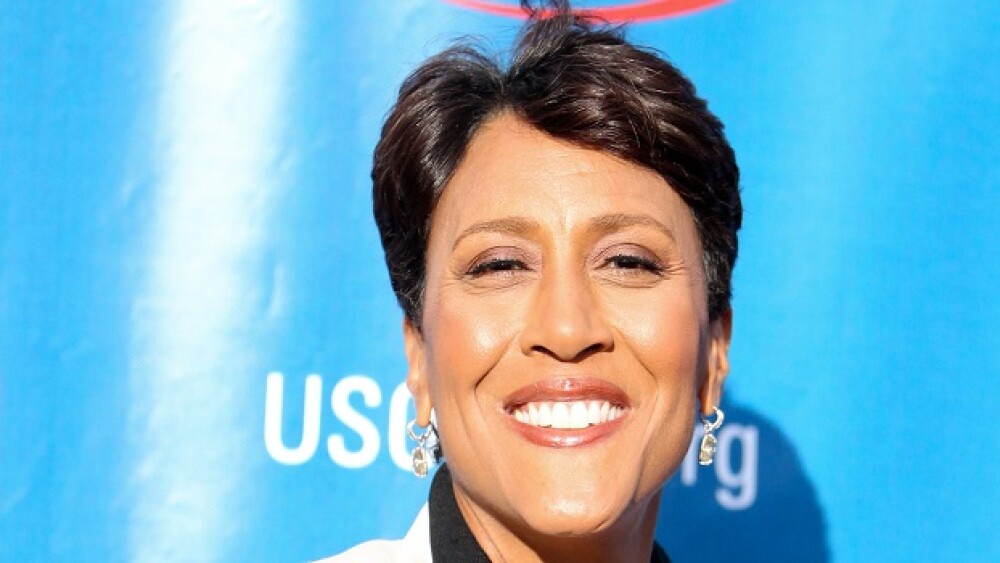Robin Roberts, ABC’s Good Morning America journalist and anchor, kicked off the 2018 BIO International Convention in Boston with her keynote address.
Debby Wong / Shutterstock
Robin Roberts, ABC’s Good Morning America journalist and anchor, kicked off the 2018 BIO International Convention in Boston with her keynote address.
Roberts began her broadcast career as a sports anchor for local TV and radio stations in Mississippi. She was a sportscaster for ESPN from 1990 to 2005. She joined Good Morning America as a co-anchor in 2005.
In 2007, Roberts was diagnosed with an early form of breast cancer. She underwent surgery and by January 2008, had received eight rounds of chemotherapy followed by six-and-a-half weeks of radiation therapy. In 2012, she was diagnosed with myelodysplastic syndrome (MDS). She received a bone marrow transplant. After taking a leave from GMA, she returned on February 20, 203. Much of her cancer journey was documented on GMA, and was cited when she received the 2012 Peabody Award, for “allowing her network to document and build a public service campaign around her battle with rare disease” and “inspire[ing] hundreds of potential bone marrow donors to register and heighten[ing] awareness of the need for even more donors.” She also received the Arthur Ashe Courage Award from EPSN at the 2013 ESPYs.
In addition, Roberts has received the Walter Cronkite Award for Excellence in Journalism and was inducted into the Broadcasting & Cable Hall of Fame, the Sports Broadcasting Hall of Fame, and named one of Glamour’s Women of the Year.
Following her keynote, Roberts was interviewed by BIO president and chief executive officer Jim Greenwood.
As part of her interview, Roberts said she grew up living by the “three D’s—Discipline, Determination, and Da Lord!” She also discussed diversity, saying, “Diversity to me is being on the team. Inclusion is being allowed to play the game.”
In a wide-ranging discussion, she talked about her experiences as a journalist, saying, “I remember as a child dreaming of playing tennis at Wimbledon so I remember the first time I went to Wimbledon with ESPN—I didn’t have a tennis racket in my hand. I had a microphone.”
She also pointed out how the work done by the companies and people at BIO were responsible for her being alive today. “This is the importance of why I want to meet with this group, to say thank you for the life-saving bone marrow transplant that I had,” adding, “It’s not about what we accomplish, it’s about what we overcome.”
Roberts also noted, in her conversation with Greenwood, that she believed “in dreaming big and focusing small.”
Other highlights of the convention today will include “Start Up Stadium: Empowering the Cutting-Edge Companies of Tomorrow, Today,” which is designed to provide start-up biotechs the chance to network with members of the investment community, venture firms and BIO attendees. Also included is an “FDA Town Hall: Roundtable discussion of FDA Center Priorities,” and a “Super Session: The Business of Biotech and Sports—A conversation with Jonathan Kraft, president, The Kraft Group & New England Patriots and Bill Sibold, Head of Sanofi Genzyme.”
Later in the day there will be Fireside Chats with Chris Austin, director of the NIH’s National Center for Advancing Translational Sciences, with Greg Hunt, Australia’s Minister of Health, with Julie Gerberding, executive vice president and chief patient officer at Merck, Ashanthi De Silva, writer and Rare Disease Editor at The Mighty, Gabriel Maldonado, executive director and chief executive officer at TRUEVOLUTION and Bryce Olson, global marketing director at Intel.
Ashanthi DeSilva was the first patient to ever receive gene therapy in 1990. She had mutations of the gene that produces adenoside deaminase (ADA), which plays an essential role in the immune system. The traditional treatment was an injection of PEG-ADA, a synthetic form of the ADA enzyme. She initially responded, but two years later was no longer responding. There were no matching donors for a bone marrow transplant. Her family agreed to a gene therapy trial by French Anderson, a geneticist at the National Institutes of Health. The treatment was largely effective. In her talk, DeSilva said, “Look at my story, and know anything is possible…”
Attention 2018 BIO Conference attendees! Whether you’re a content-hungry life sciences professional or represent an organization looking for top talent, be sure to stop by the BioSpace booth during this event. Conveniently located near the entrance to the vendor space, booth number 2410 is the place to learn about everything BioSpace has to offer. Come talk to BioSpace CEO Josh Goodwin and Media Executive Melissa Nazzaro to talk about trends in the life sciences industry, pick up free BioSpace Hotbed map promo items, and learn how BioSpace can help you stay informed in a rapidly changing biotech landscape.
See you at booth 2410!





